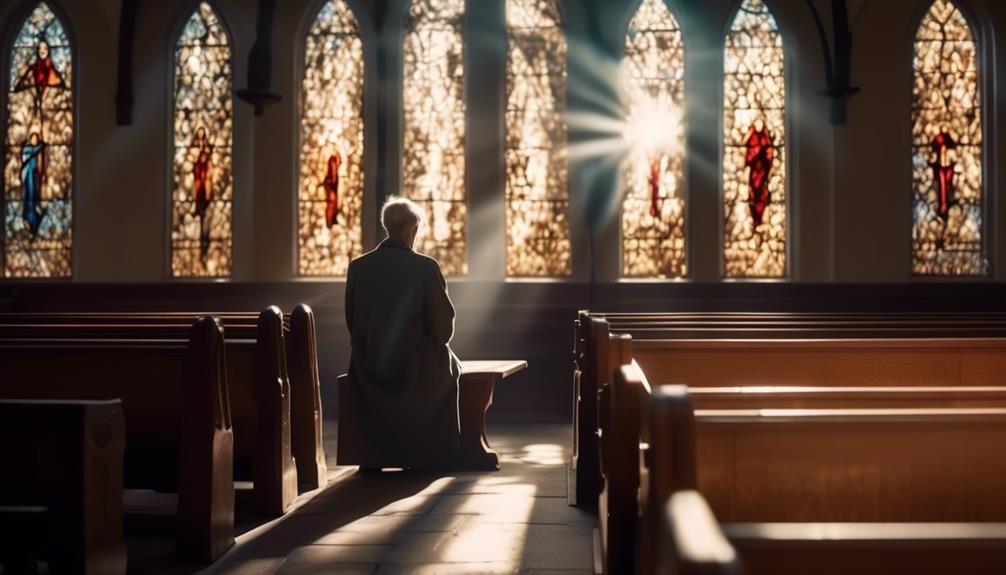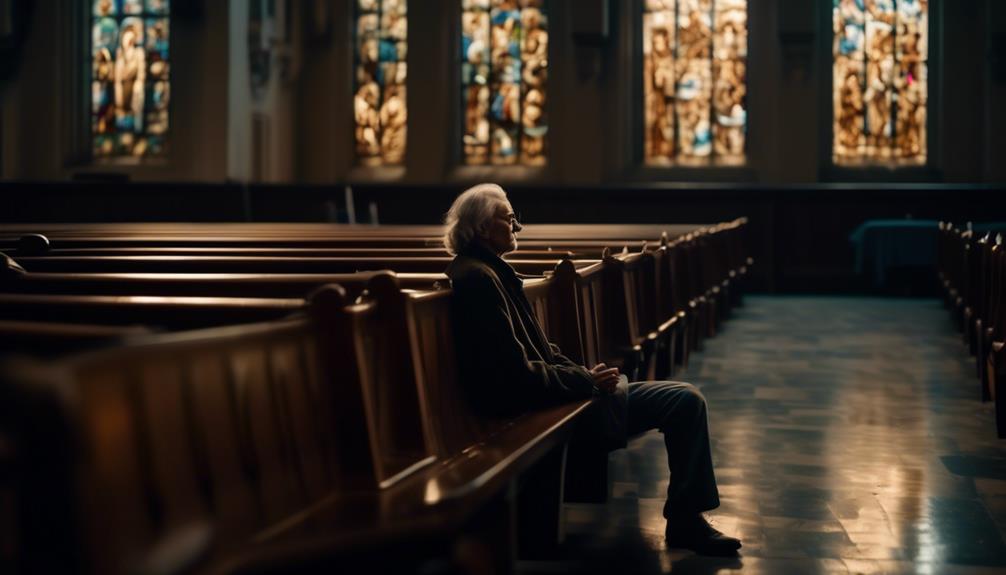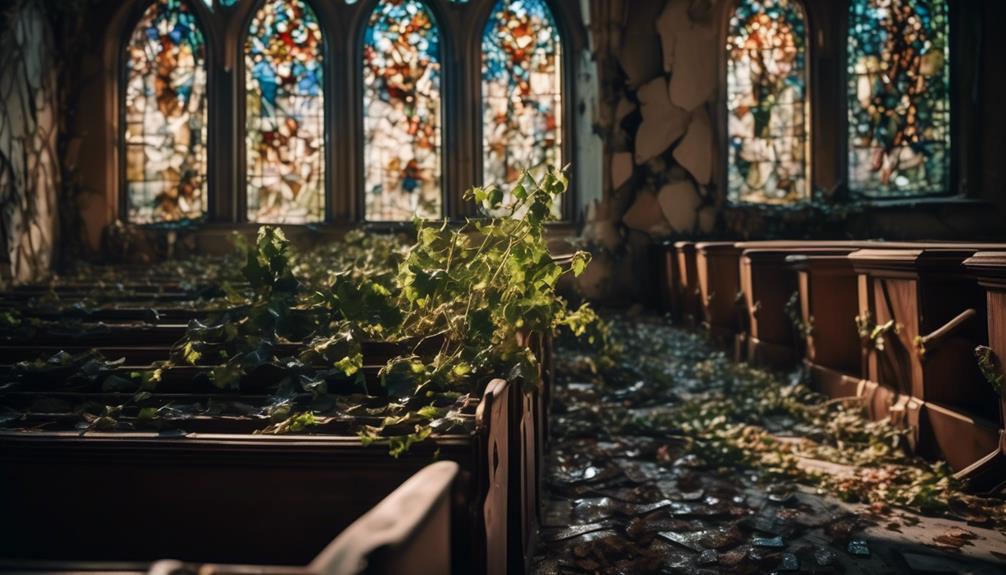In the realm of personal belief and faith, one's spiritual journey is often marked by periods of growth, introspection, and, at times, difficult decisions. For some, these moments may lead to a departure from the religious institutions they once called home. In my own journey, I found myself parting ways with the Methodist Church, but the reasons behind my decision were not hasty or impulsive. Rather, they were born out of a gradual process of questioning, internal reflection, and a desire to find a deeper sense of belonging and inclusivity. As I embarked on this path, I discovered that my departure from the Methodist Church was not solely a search for a new spiritual community, but a quest to align my beliefs with my evolving understanding of the world.
Key Takeaways
- Faith crises and questioning of beliefs and teachings are common within the Methodist Church, leading some individuals to leave.
- Disagreements with church teachings, particularly regarding LGBTQ+ inclusion, women in leadership, scripture interpretation, and social justice issues, contribute to individuals leaving the Methodist Church.
- Feeling disconnected from the community due to discrepancies between personal beliefs and church teachings can also drive individuals to seek spiritual communities that align more closely with their values.
- Personal spirituality plays a significant role in shaping individuals' faith experiences and can lead them to explore other religious communities in search of a deeper sense of belonging and inclusivity.
Early Doubts and Questioning

In the early stages of their journey, individuals may experience a sense of uncertainty and engage in a process of questioning within the Methodist Church. This phase often arises due to a faith crisis, where individuals begin to question their beliefs and the teachings of the church. It is during this time that theological exploration becomes crucial in determining one's faith path.
Faith crises can be triggered by various factors, such as personal experiences, encountering differing viewpoints, or exposure to new information. These challenges to one's faith can lead individuals to question the core tenets of the Methodist Church and seek a deeper understanding of their beliefs. This process of questioning is essential for personal growth and the development of a more mature and nuanced faith.
Theological exploration plays a significant role in this early stage of doubt and questioning. It involves studying and reflecting on the foundations of Methodist theology, examining scripture, and engaging in critical discussions with fellow believers. Through this exploration, individuals can gain a deeper understanding of their faith, address their doubts, and ultimately make informed decisions about their religious journey.
It is important to note that this process of questioning and theological exploration is not unique to the Methodist Church. Many religious traditions and denominations encourage individuals to critically examine their beliefs to build a more robust and authentic faith. This freedom to question and explore is essential for personal growth and a genuine commitment to one's religious beliefs.
Disagreements With Church Teachings
Discrepancies between personal beliefs and the teachings of the Methodist Church often give rise to disagreements within the faith community. When individuals find themselves at odds with church doctrine, it can lead to a crisis of faith and ultimately, a decision to leave the Methodist Church. Here are five common areas of theological differences that often result in disagreements:
- LGBTQ+ Inclusion: The Methodist Church's stance on homosexuality and same-sex marriage has been a contentious issue for many. Some individuals believe in full inclusion and acceptance of LGBTQ+ individuals within the church, while the official teachings of the Methodist Church condemn homosexual acts as incompatible with Christian teaching.
- Women in Leadership: Another point of contention revolves around the role of women in leadership positions within the church. While some Methodists advocate for gender equality and support women's ordination, others adhere to traditional interpretations of scripture that limit women's roles in pastoral leadership.
- Scriptural Interpretation: Differing interpretations of scripture can also lead to disagreements within the Methodist Church. Individuals may hold divergent views on topics such as the authority of the Bible, the nature of salvation, or the role of miracles.
- Social Justice: The Methodist Church has a long history of advocating for social justice issues. However, disagreements can arise when individuals feel that the church's stance on certain issues, such as racism, poverty, or environmental conservation, does not align with their personal beliefs or the urgency they feel to address these issues.
- Traditionalism vs. Progressivism: The tension between those who advocate for maintaining traditional practices and beliefs versus those who push for progress and adaptation can often lead to significant disagreements within the Methodist Church. These differences can encompass a wide range of topics, from worship styles and liturgy to theological understandings of salvation.
These discrepancies in personal beliefs and church teachings can create significant challenges for individuals who seek a religious community that aligns more closely with their values. Ultimately, the decision to leave the Methodist Church often stems from a desire for greater freedom to explore and practice one's own faith.
Feeling Disconnected From the Community

A sense of disconnection from the community can often arise as a result of the discrepancies between an individual's personal beliefs and the teachings of the Methodist Church. When an individual finds themselves at odds with the doctrines and practices of the church, it can lead to a feeling of isolation and detachment from the larger community. Church involvement and community support are crucial factors in fostering a sense of belonging and connectedness, but when these are compromised, it can prompt individuals to seek alternative spiritual communities or even leave the church altogether.
Church involvement plays a significant role in creating a sense of community and belonging. Active participation in church activities, such as worship services, small groups, and volunteer opportunities, allows individuals to build relationships with like-minded individuals who share similar values and beliefs. The Methodist Church, like many other religious institutions, emphasizes the importance of community and encourages its members to engage in fellowship and service. However, when an individual feels disconnected from the teachings and practices of the church, their level of church involvement may decrease, leading to a reduced sense of community.
Community support is another essential aspect of fostering a sense of belonging within a religious community. The Methodist Church, with its emphasis on social justice and outreach, often provides a support system for its members. This support can come in various forms, such as emotional, spiritual, and practical assistance in times of need. However, when an individual's personal beliefs do not align with the church's teachings, they may feel unsupported or misunderstood by the community, further exacerbating their sense of disconnection.
The Role of Personal Spirituality
The role of personal spirituality plays a significant part in individuals' experiences within the Methodist Church. It encompasses their individual faith journeys and their personal connection to God. Exploring the role of personal spirituality can provide insight into why some individuals may choose to leave the Methodist Church and seek a different path for their spiritual growth and fulfillment.
Individual Faith Experiences
Personal spirituality plays a significant role in shaping individual faith experiences within the Methodist Church. The Methodist tradition emphasizes the importance of personal growth and religious exploration, allowing individuals to develop their own understanding of faith and spirituality. Here are five key aspects that highlight the impact of personal spirituality on individual faith experiences within the Methodist Church:
- Freedom of interpretation: Methodism encourages individuals to interpret scripture and religious teachings based on their own personal experiences and insights.
- Spiritual practices: Methodist congregations provide opportunities for individuals to engage in various spiritual practices such as prayer, meditation, and contemplation, enabling them to deepen their connection with the divine.
- Discernment and decision-making: Personal spirituality enables individuals to discern and make decisions based on their own beliefs and values, allowing for a more authentic faith experience.
- Connection to community: Personal spirituality fosters a sense of belonging and connection within the Methodist community, as individuals share their faith journeys and support one another in their spiritual growth.
- Continual growth: Methodist theology emphasizes the concept of sanctification, encouraging individuals to continually seek personal growth and spiritual development throughout their lives.
Personal Connection to God
As individuals explore their personal spirituality within the Methodist Church, their quest for a deeper connection to God becomes paramount. Personal growth and the spiritual journey are central to this pursuit. Methodism encourages its adherents to cultivate a personal relationship with God through various practices such as prayer, meditation, and Bible study. These practices provide a framework for individuals to connect with the divine and experience personal transformation.
The table below illustrates the role of personal spirituality in fostering a deeper connection with God within the Methodist Church:
| Role of Personal Spirituality in Fostering a Deeper Connection with God | ||
|---|---|---|
| 1. Enhances personal growth | 2. Provides a sense of purpose and meaning | 3. Nurtures a sense of belonging and community |
| 4. Facilitates spiritual discernment and guidance | 5. Cultivates a sense of peace and inner fulfillment | 6. Promotes spiritual empowerment and transformation |
Seeking a More Inclusive Environment

In response to the changing social climate and a growing desire for inclusivity, individuals are increasingly seeking out alternative religious communities. The quest for a more inclusive environment has become a driving force for many people who feel that their current religious institutions fall short in terms of acceptance and diversity. Here are five reasons why individuals are seeking a more inclusive environment:
- Acceptance vs. Exclusion: Many individuals feel that traditional religious institutions promote exclusionary practices and teachings that do not align with their personal values. They seek communities that embrace diversity and foster acceptance of all individuals, regardless of their background or identity.
- Challenges in Diversity: Religious institutions have historically struggled with embracing diversity, whether it be in terms of race, gender, sexual orientation, or other aspects of identity. Inclusive communities provide a safe space where individuals feel valued and celebrated for who they are, rather than being marginalized or judged.
- Expanding Definitions of Family: As society's understanding of family evolves, some individuals may not feel supported by religious communities that adhere to traditional notions of family. Inclusive communities acknowledge and celebrate a broader range of family structures, providing a sense of belonging for those who do not fit the traditional mold.
- Intersectionality: Inclusive communities recognize the interconnectedness of various forms of oppression and discrimination. They strive to create environments where individuals are not only accepted for one aspect of their identity, but for the entirety of who they are, including their race, gender, sexuality, and more.
- Social Justice and Activism: Many individuals seek religious communities that actively engage in social justice issues and work towards creating a more equitable society. They desire a faith community that not only preaches inclusivity but also takes tangible action to address systemic injustices.
As individuals become more aware of the importance of inclusivity, they are increasingly seeking out religious communities that align with their values. These communities provide a sense of belonging, acceptance, and support, which is crucial in an ever-changing and diverse world.
Finding a New Sense of Belonging
The search for a new sense of belonging drives individuals to explore alternative religious communities that prioritize inclusivity and acceptance. When individuals leave the Methodist Church, they often find themselves in a position of needing to rebuild their social networks and establish new friendships within a different religious community. This process of exploring options can be both daunting and exciting, as individuals seek to find a community that aligns with their beliefs and values.
One of the key factors in finding a new sense of belonging is the opportunity to form new friendships. Joining a different religious community provides individuals with the chance to meet new people who share similar interests and beliefs. These new friendships can provide a sense of support and camaraderie, helping individuals navigate their spiritual journey in a more fulfilling way.
Moreover, exploring different religious options can be a liberating experience. It allows individuals to examine their own beliefs and values, and to find a community that aligns with their personal convictions. This process of exploration can be challenging, as it requires individuals to step outside of their comfort zones and challenge preconceived notions. However, it can also be empowering, as it allows individuals to find a religious community that truly embraces and accepts them for who they are.
Frequently Asked Questions
Did the Author Have Any Negative Experiences With Specific Individuals or Leaders Within the Methodist Church That Contributed to Their Decision to Leave?
The author's decision to leave the Methodist Church was influenced by negative experiences with specific individuals or leaders within the church. These experiences, which are discussed in detail in the context of "Why I Left The Methodist Church," played a significant role in shaping the author's perspective and ultimately led to their departure. The author's account highlights the importance of individual interactions and leadership within religious institutions and their potential impact on personal beliefs and decisions.
How Did the Author's Family and Close Friends React to Their Decision to Leave the Methodist Church?
The author's decision to leave the Methodist Church had an impact on their personal relationships, particularly with their family and close friends. The reactions varied, as some individuals provided emotional support and acceptance, while others struggled to understand and accept the author's choice. It is important to note that personal experiences and relationships play a significant role in shaping an individual's decision to leave a religious institution. These reactions highlight the complexity of navigating personal beliefs and maintaining relationships within a religious community.
Did the Author Explore Other Christian Denominations or Religious Traditions Before Ultimately Deciding to Leave the Methodist Church?
In their personal spiritual journey, the author did explore other Christian denominations and religious traditions before ultimately deciding to leave the Methodist Church. They sought to broaden their understanding and find a spiritual path that resonated with their beliefs and values. This exploration allowed them to gain insight into different traditions, their practices, and their interpretations of faith. Ultimately, this exploration played a significant role in shaping their decision to leave the Methodist Church.
What Was the Author's Perception of the Methodist Church's Stance on Social and Political Issues, and How Did This Factor Into Their Decision to Leave?
The author's perception of the Methodist Church's stance on social and political issues played a significant role in their decision to leave. Their personal experiences with individuals and leaders within the church, as well as the reaction of their family and friends, further influenced their decision. Additionally, the author explored other Christian denominations in search of a community that aligned more closely with their own beliefs and values. However, they faced challenges in finding a new community that provided the freedom and acceptance they desired.
Did the Author Encounter Any Challenges or Difficulties in Finding a New Spiritual Community or Sense of Belonging After Leaving the Methodist Church?
Finding a new spiritual community or sense of belonging after leaving the Methodist Church can present challenges. The transition may involve a loss of familiar rituals, community support, and a shared belief system. Individuals may struggle to find a new community that aligns with their spiritual values and provides a sense of belonging. Factors such as geographical location, availability of alternative religious institutions, and personal preferences can influence the difficulty of this search.
Conclusion
In conclusion, my decision to leave the Methodist Church was driven by a combination of early doubts and questioning, disagreements with church teachings, feeling disconnected from the community, and the desire for a more inclusive environment. While some may argue that one should stay and work towards change from within, it is essential to prioritize personal spiritual growth and finding a sense of belonging in a community that aligns with one's values.

